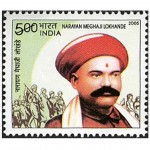Narayan Meghaji Lokhande: Difference between revisions
No edit summary |
No edit summary |
||
| (5 intermediate revisions by the same user not shown) | |||
| Line 1: | Line 1: | ||
[[File:Narayan-Meghaji-Lokhande-1v-150x150.jpg]]<br> | |||
A social reformer who was associated with the cause of mill workers and was the first one to organise workers in 1884. He was part of the Satyashodak movement led by Jyotiba Phule. | A social reformer who was associated with the cause of mill workers and was the first one to organise workers in 1884. He was part of the Satyashodak movement led by Jyotiba Phule. | ||
Lokhande took up the issues of regular working hours, weekly holidays. | He formed one of the first labour association, named [[Bombay Mill Hands Association]]. Lokhande took up the issues of regular working hours, weekly holidays, thirty minutes off for lunch and rest after sundown. He organised the first public meeting of workers on 23rd September 1884 at Suparibaug in Parel which was attended by 4000 workers. | ||
In a resolution adopted at the meeting the following demands were made: | |||
(1) One complete day of rest every Sunday for all mill-hands. | |||
(2) Half an hour rest at noon on every working day. | |||
(3) Hours of work from 6:30 am to sunset. | |||
(4) Payment of wages be made not later than 15th of the next month. | |||
(5) A workman sustaining serious injury in the course of work at the mill, dis-abling him for some time, should receive full wages until he recovers, and in case of being maimed for life, suitable provisions be made for his livelihood. | |||
He also edited Deenbandhu, the first labour journal in India. | |||
He was in opposition to Tilaks' idea of making Ganesh Chaturthi into a community event as he considered it to be a non-secular event which would only serve to take the masses towards superstition and ignorance. At that time he had unsuccessfully tried to get it banned by the British. | He was in opposition to Tilaks' idea of making Ganesh Chaturthi into a community event as he considered it to be a non-secular event which would only serve to take the masses towards superstition and ignorance. At that time he had unsuccessfully tried to get it banned by the British. | ||
Further Readings: | |||
One Hundred Years, One Hundred Voices by Neera Adarkar and Meena Menon. | One Hundred Years, One Hundred Voices by Neera Adarkar and Meena Menon. | ||
Nalini Pandit. Economic and Political Weekly February 15, 1997, Narayan Meghaji Lokhande: The Father of Trade Union Movement in India | |||
Latest revision as of 14:01, 15 November 2017

A social reformer who was associated with the cause of mill workers and was the first one to organise workers in 1884. He was part of the Satyashodak movement led by Jyotiba Phule.
He formed one of the first labour association, named Bombay Mill Hands Association. Lokhande took up the issues of regular working hours, weekly holidays, thirty minutes off for lunch and rest after sundown. He organised the first public meeting of workers on 23rd September 1884 at Suparibaug in Parel which was attended by 4000 workers.
In a resolution adopted at the meeting the following demands were made:
(1) One complete day of rest every Sunday for all mill-hands.
(2) Half an hour rest at noon on every working day.
(3) Hours of work from 6:30 am to sunset.
(4) Payment of wages be made not later than 15th of the next month.
(5) A workman sustaining serious injury in the course of work at the mill, dis-abling him for some time, should receive full wages until he recovers, and in case of being maimed for life, suitable provisions be made for his livelihood.
He also edited Deenbandhu, the first labour journal in India. He was in opposition to Tilaks' idea of making Ganesh Chaturthi into a community event as he considered it to be a non-secular event which would only serve to take the masses towards superstition and ignorance. At that time he had unsuccessfully tried to get it banned by the British.
Further Readings:
One Hundred Years, One Hundred Voices by Neera Adarkar and Meena Menon.
Nalini Pandit. Economic and Political Weekly February 15, 1997, Narayan Meghaji Lokhande: The Father of Trade Union Movement in India
